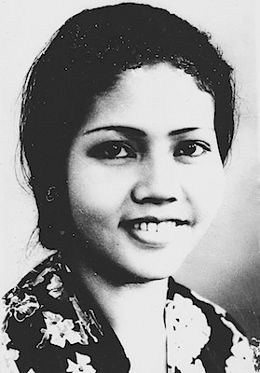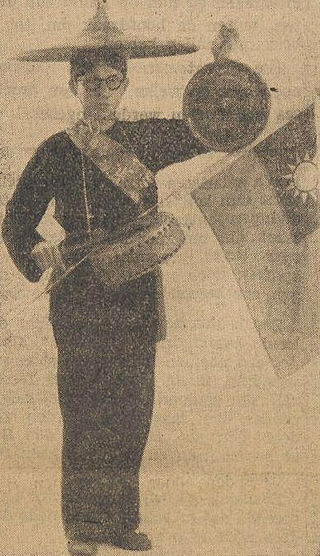
Roekiah, often credited as Miss Roekiah, was an Indonesian kroncong singer and actress. The daughter of two stage performers, she began her career at the age of seven; by 1932 she had become well known in Batavia, Dutch East Indies, as a singer and stage actress. Around this time she met Kartolo, whom she married in 1934. The two acted in the 1937 hit film Terang Boelan, in which Roekiah and Rd Mochtar played young lovers.

Kedok Ketawa is a 1940 action film from the Dutch East Indies. Union Films' first production, it was directed by Jo An Djan. Starring Basoeki Resobowo, Fatimah, and Oedjang, the film follows a young couple who fight off criminals with the help of a masked man.

Air Mata Iboe is a 1941 drama film from the Dutch East Indies directed and written by Njoo Cheong Seng. Starring Fifi Young, Rd Ismail, Ali Sarosa, and Ali Joego, it followed a mother who raises her children lovingly but is ultimately betrayed by her eldest sons when she falls upon hard times. The film, billed as a "musical extravaganza," featured a soundtrack by R. Koesbini, and an eponymous title song written by Njoo.

Panggilan Darah is a 1941 film from the Dutch East Indies written and directed by Sutan Usman Karim and produced by Tjho Seng Han for Oriental Film. The black-and-white film starred Dhalia and Soerip as orphaned sisters trying to make a living in the colonial capital of Batavia before moving to Kudus to work at a clove cigarette factory.

Srigala Item is a 1941 film from the Dutch East Indies that was directed by Tan Tjoei Hock and produced by The Teng Chun for Action Film. Starring Hadidjah, Mohamad Mochtar, and Tan Tjeng Bok, the film's plot – inspired by Zorro – follows a young man who became a masked vigilante to take revenge against his conniving uncle. Srigala Item was a commercial success, which Misbach Yusa Biran credits to the plot's use for escapism. A copy of the black-and-white film, which featured kroncong music, is stored at Sinematek Indonesia.

Asmara Moerni is a 1941 romance film from the Dutch East Indies directed by Rd Ariffien and produced by Ang Hock Liem for Union Films. Written by Saeroen, the film followed a doctor who falls in love with his maid, as well as her failed romance with a fellow villager. Starring Adnan Kapau Gani, Djoewariah, and S. Joesoef, the black-and-white film was cast and advertised to cater to the growing native intelligentsia. Despite mixed reviews, it was a commercial success. As with most films of the Indies, Asmara Moerni may be lost.

Wanita dan Satria is a 1941 film from the Dutch East Indies directed by Rd Ariffien and produced by Ang Hock Liem for Union Films that is probably lost. Starring Djoewariah, Ratna Djoewita, Hidajat, Z. Algadrie, and Moesa, it follows a womaniser named Soedrajat who abuses his status to gain women's trust before ultimately getting his comeuppance. Reviews were mostly positive, with one praising the film's depiction of women's issues in a Muslim society.

Ajah Berdosa is a likely-lost 1941 film from the Dutch East Indies directed by Wu Tsun for Star Film. Starring M. Arief, S Waldy, Elly Joenara, and Soetijem, it follows a villager named Mardiman over a period of several years, in which he loses everything owing to his infatuation with a "modern" woman.

Poesaka Terpendam is a 1941 film from the Dutch East Indies produced by Tan's Film and starring Roekiah, Djoemala, and Kartolo.

Tjioeng Wanara is a 1941 film from the Dutch East Indies directed and produced by Jo Eng Sek. Starring R Sukran, Elly Joenara and AB Djoenaedi, it featured more than 500 people in supporting roles. The film follows a young prince named Tjioeng Wanara who must reclaim his throne from the cruel King of Galuh; it is adapted from the Sundanese legend of the same name.

Elly Joenara was an Indonesian film actress who later became a producer. She was the wife of producer Djamaluddin Malik.

Pantjawarna is a 1941 film from the Dutch East Indies.
Singa Laoet is a 1941 film from the Dutch East Indies. Directed by Tan Tjoei Hock and produced by The Teng Chun, it starred Tan Tjen Bok, Mohamad Mochtar, and Hadidjah.

Star Film was a film production company in the Dutch East Indies. Established by Chinese-Indonesian businessman Jo Eng Sek and Chinese cameraman Cho' Chin Hsin in 1940, it produced five black-and-white films in 1940 and 1941; two of these were directed by Jo, and the remainder were directed by Wu Tsun. Another film was under production when the studio was closed following the Japanese occupation of the Dutch East Indies. Star helped establish the careers of actors such as S Waldy and Elly Joenara, and produced screenplays written by Rd Ariffien and Saeroen; its output, however, is probably lost.

Union Films was a film production company located in Batavia, Dutch East Indies. Established by ethnic Chinese businessmen Ang Hock Liem and Tjoa Ma Tjoen in 1940, it produced seven black-and-white films before it was dissolved in 1942; all are thought to be lost. The company's films were directed by four men, mostly ethnic Chinese, and launched the careers of actors such as Rendra Karno and Djoewariah.

Soeara Berbisa is a 1941 film from the Dutch East Indies. Produced by Ang Hock Liem for Union Films and directed by R Hu, this black-and-white film stars Raden Soekarno, Ratna Djoewita, Oedjang, and Soehaena. The story, written by Djojopranoto, follows two young men who compete for the affections of a woman before learning that they are long-lost brothers.

Oriental Film was a film production company in Batavia, Dutch East Indies. Established by ethnic Chinese businessman Tjo Seng Han in 1940, it completed four black-and-white films before it was closed in 1941. All the company's films were screened into the 1950s but may now be lost. They were directed by two men, Njoo Cheong Seng and Sutan Usman Karim, and launched the careers of actors such as Dhalia and Soerip.

Pah Wongso Tersangka, also known under the Dutch title Pah Wongso Keert Terug, is a 1941 film from the Dutch East Indies directed by Wu Tsun for Star Film. Saeroen's first work for the company, it is a sequel to the 1940 detective film Pah Wongso Pendekar Boediman, and stars the social worker L. V. Wijnhamer, Jr as a man who comes under suspicion and must clear his name. This possibly-lost film was styled as a comedy.

Louis Victor Wijnhamer, better known as Pah Wongso, was an Indo social worker popular within the ethnic Chinese community of the Dutch East Indies, and subsequently Indonesia. Educated in Semarang and Surabaya, Pah Wongso began his social work in the early 1930s, using traditional arts such as wayang golek to promote such causes as monogamy and abstinence. By 1938, he had established a school for the poor, and was raising money for the Red Cross to send aid to China.




















